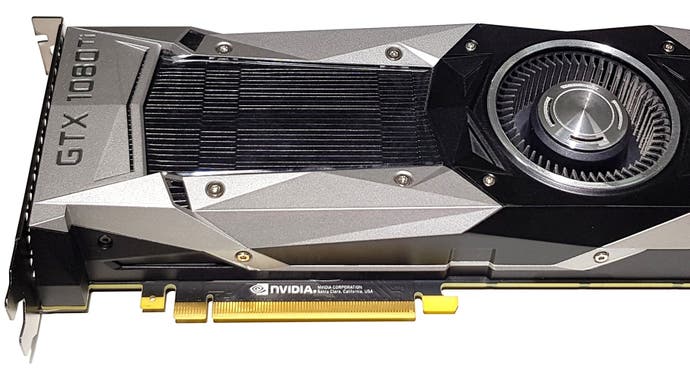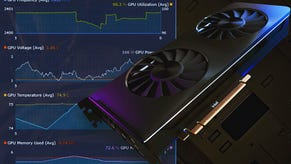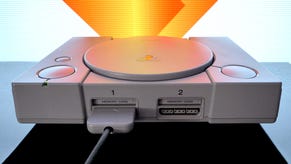DF Weekly: Alan Wake 2 delivers a day of reckoning for older PC GPU owners
But perfectly viable upgrades needn't cost the earth.
We'd been expecting a game to arrive that would practically demand that you upgrade your PC hardware, and it's not entirely surprising that it would be Remedy's Alan Wake 2. However, what we didn't expect was it would be support for DX12 mesh shader hardware that would be the dividing line between a good experience and a bad one. Practically, what this means is that there's bad news here for owners of vintage 2016/2017 Nvidia GTX 10-series Pascal hardware as Alan Wake 2 performance is pretty dire, even on the majestic GTX 1080 Ti. The lack of mesh shader support also means that AMD's vintage 2019 RDNA 1 cards also suffer, though not quite to the same degree.
You can read all about what mesh shaders actually are elsewhere, but the bottom line is that it more easily allows for the efficient processing of detail-rich scenes - and Alan Wake 2 is awash with incredibly high detail assets. On PC, fallbacks exist to allow the game to run on older GPUs, but you have to accept some alarming drops in performance. Even on GTX 1080 Ti, I noted that the game could drop into the teens running at 1080p, upscaled from 720p using FSR 2 quality mode. In those same scenes, the RTX 2080 - often cited as having similar rasterisation performance to the 1080 Ti - runs 6.3x faster.
Those results are something of an outlier, but even in more standard AW2 gaming, there's still a stark divide between three GPUs that generally have similar rasterisation capabilities. In the forest at the beginning of the game, the RTX 2080 beats 1080 Ti with an additional 177 percent of performance, while the RX 5700 XT is 63 percent faster than the Pascal legend.
- 0:00:00 Introduction
- 0:00:45 News 01: Alan Wake 2: a tech masterpiece
- 0:34:12 News 02: New PS5 needs internet to pair disc drive
- 0:42:18 News 03: MGS Master Collection Volume 1 released
- 0:58:16 News 04: MGS Delta Snake Eater demoed
- 1:07:37 News 05: Star Citizen improvements, new content shown off at CitizenCon
- 1:21:48 Supporter Q1: Given that Alan Wake 2 doesn’t support Pascal GPUs, is it time for a GTX 1080/Ti eulogy?
- 1:28:51 Supporter Q2: Any thoughts on Intel's 14th gen CPUs?
- 1:31:24 Supporter Q3: How could Horizon Zero Dawn and TLOU 2 be meaningfully remastered for PS5?
- 1:40:53 Supporter Q4: Are better visual features really worth the image quality hit on consoles?
- 1:49:10 Supporter Q5: What are John's impressions of the Meta Quest 3?
A day of reckoning was always coming for 10-series cards and up until the release of Alan Wake 2, the smart money would have been on mandatory support for hardware accelerated ray tracing representing the main reason to upgrade. The idea that it would be mesh shaders that would represent the dividing line does come as a bit of a surprise, but the bottom line is that the current generation consoles' support for RT is a little lacklustre, while mesh shading support clearly works, as Alan Wake 2 looks stunning on today's consoles. Even PlayStation 5, which features a less robust geometry engine, seems to deliver good results and strong performance.
The general panic surrounding Alan Wake's PC performance was amplified somewhat by recommended specs from Remedy itself, which - I think it's fair to say - are somewhat conservative. Remedy lists the AMD Radeon RX 6600 as a base-spec GPU for Alan Wake 2, citing 1080p at low settings at 30fps in terms of expectation levels for that class of hardware. We must be looking at absolute worst case scenarios there, because even on the equivalent of PS5's quality mode (essentially the medium preset, with low quality post-processing), the game runs much faster than that.
It also turns out that the mesh shader requirement for good performance means that GPUs that are far less capable than the RX 6600 work surprisingly well. Take Nvidia's GTX 16-class GPUs, for example. You can think of them as RTX 20-series offerings with the RT and tensor cores stripped out and while performance of, say, the GTX 1660 Ti is weaker than an RTX 2060 generally, I could still play Alan Wake at PS5 quality mode settings at 1080p resolution using FSR 2 quality mode and performance remained above 30fps. This is because some DX12 features such as variable rate shading and - yes - mesh shaders are still supported on those cut-back Turing GPUs.
There are still a vast amount of 10-series GTX cards in use though, and the concept of effectively being forced to upgrade your PC can be troublesome because pricing in the graphics market hasn't been great in recent times. However, there are plenty of strong options that needn't break the bank. The RX 6600 may have limited RT performance, but it does support the full DX12 Ultimate feature set and it's typically available around the $180/£180 mark. Meanwhile, I noted over the weekend that the more useful RX 6650 XT now sits just north of $200/£200 on sale. There's also much to commend the RTX 3060 12GB and the RTX 4060 8GB. One has more memory, the other has better performance and frame generation - both are now available well below $299/£299. If you spent £500-£600 on the GTX 1080 Ti back in the day, a similar amount of money gets you an RX 7800 XT or RTX 4070, both of which represent solid upgrades.
In short, Alan Wake 2 may be demanding an upgrade for those on older GPUs, but the game is scalable enough to ensure you don't need to be spending thousands on an RTX 4090 to be able to enjoy an excellent experience from the game. And the truth is, while Alan Wake 2 has very specific requirements with game-changing performance benefits, the move away from cross-gen releases towards titles specifically targeting PS5-class hardware has necessitated the need for more horsepower outside of the graphics arena.
An SSD is essentially mandatory now for the latest games, but perhaps more impactful is the need for more powerful CPU. There was a time when Zen 2 class Ryzens like the classic Ryzen 5 3600 usually proved more than enough to hit a 60fps baseline - but more and more games are requiring something much meatier. Right now, I'd be recommending a Ryzen 5 5600 or Intel Core i5 12400F as the minimum for a mainstream build - and this in itself may require the purchase of a new motherboard and perhaps some memory too. At least Ryzen 5000 is compatible with a range of older boards and in the Ryzen 7 5800X3D, it's possible to extend the life of a 2018-class gaming PC to a surprising extent.
Alan Wake 2 may represent a watershed of sorts for PC gaming, while mesh shader support practically demands a GPU upgrade for those with older video cards. However, console users have had to upgrade from Xbox One/PS4 to Xbox Series/PS5 and there always comes a time when a new game - or a new wave of games - demands some kind of PC upgrade. But to put it plainly: trust me, Alan Wake 2 is worth it.


















